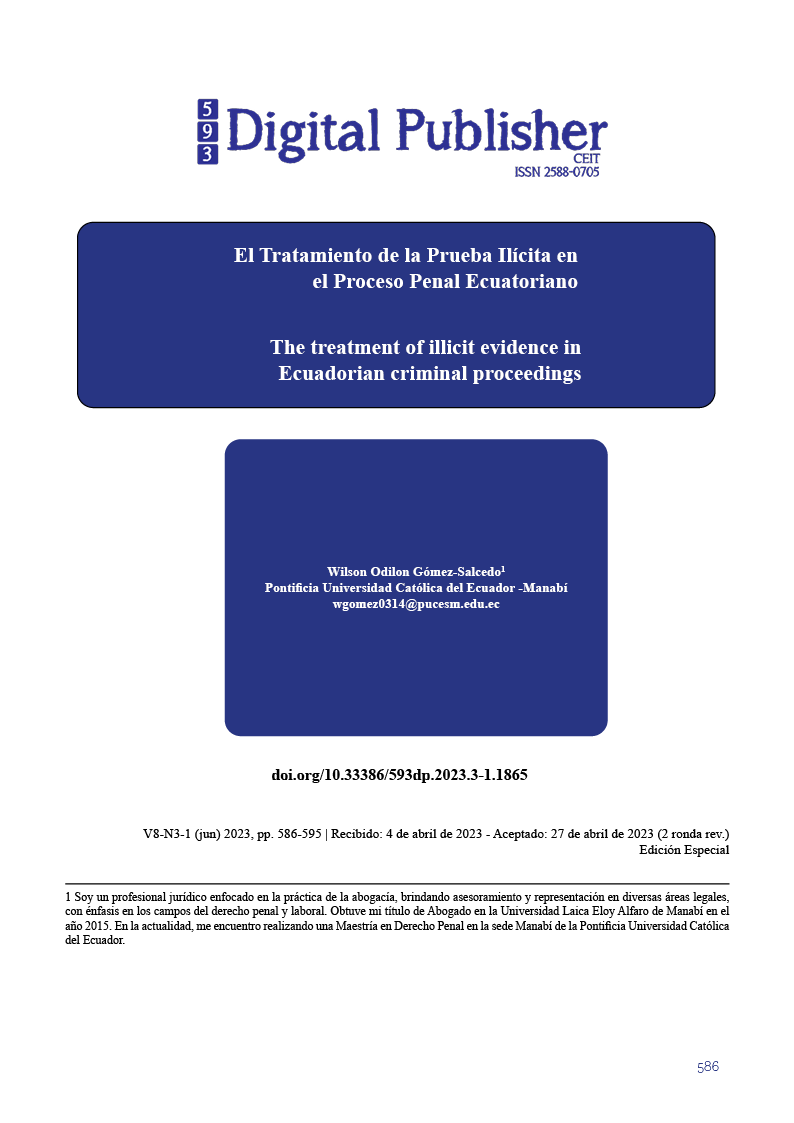The treatment of illicit evidence in Ecuadorian criminal proceedings
Main Article Content
Abstract
This investigation establishes an object focused on the analysis of the treatment of illicit evidence in the Ecuadorian criminal process to establish whether it is possible to obtain a resolution based on such evidence.
Remember that evidence is in law one of the fundamental tools to convince and prove the facts to the judicial body. Therefore, this evidence must be obtained in a way that does not infringe fundamental rights. If there is such a violation, the rule of evidentiary exclusion applies.
However, international doctrine, precepts and judgments provide for certain exceptions to this evidentiary exclusion that could give rise to decisions based on unlawful evidence. In this way, this article provides concepts, object and legal nature of illicit evidence, as well as the analysis of doctrinal theories and international judicial decisions.
This, through a methodological framework of documentary and bibliographic scope and a correlational research level due to the effective relationship of the variables. It will be demonstrated in the present investigation whether the illicit evidence can be valued or not, taking a position.
Downloads
Article Details

This work is licensed under a Creative Commons Attribution-NonCommercial-ShareAlike 4.0 International License.
1. Derechos de autor
Las obras que se publican en 593 Digital Publisher CEIT están sujetas a los siguientes términos:
1.1. 593 Digital Publisher CEIT, conserva los derechos patrimoniales (copyright) de las obras publicadas, favorece y permite la reutilización de las mismas bajo la licencia Licencia Creative Commons 4.0 de Reconocimiento-NoComercial-CompartirIgual 4.0, por lo cual se pueden copiar, usar, difundir, transmitir y exponer públicamente, siempre que:
1.1.a. Se cite la autoría y fuente original de su publicación (revista, editorial, URL).
1.1.b. No se usen para fines comerciales u onerosos.
1.1.c. Se mencione la existencia y especificaciones de esta licencia de uso.
References
Andrade, N. V. (2020). La prueba ilícita en el proceso penal ecuatoriano: Bases doctrinales y jurídicas. Journal of Business and entrepreneurial.
Arcos, K. (2020). La relevancia jurídica de la exclusión de la prueba en materia penal. Quito. Obtenido de https://repositorio.uasb.edu.ec/bitstream/10644/7465/1/T3262-MDP-Arcos-La%20relevancia.pdf
Astudillo, A. M. (2008). La investigación en la era de la informaicón. México: Trillas.
C-591, S. (2005). Corte Constitucional, sentencia C-591.
Constitución de la República del Ecuador. (Registro Oficial 449 de 20-oct-2008). Ecuador.
Crespo, D. (2019). Análisis de la exclusión, rechazo o inadmisibilidad de los medios de prueba previstos en la audiencia evaluatoria y preparatoria del juicio penal en Ecuador . Quito: Universidad Andina Simón Bolívar.
Echandia, D. (1995). Teoría General de la Prueba Judicial. Tomo I. Bogotá: Editorial ABC.
Estrampes, M. M. (2010). La prueba ilícita: La regla de la exclusión probatoria y sus excepciones. Revista Catalana de Seguretat pública.
Gargallo, A. P. (2014). La Prueba Prohibida: Evolución Jurisprudencial. España: Editorial Aranzadi.
Ibarra, K. (2017). Los efectos de la prueba ilícita en Colombia: Caso miti – miti. Verba Iuris.
QuestionPro, E. d. (21 de noviembre de 2019). QuestionPro. Recuperado el 5 de febrero de 2022, de ¿Qué es la investigación cualitativa?: https://www.questionpro.com/es/investigacion-cualitativa.html
Redondo, A. M. (1977). Los nuevos medios de prueba y la posibilidad de su uso en el proceso. Editorial Departamento de Derecho Procesal de la Universidad.
Rodríguez, A. M., & Moya, M. A. (2008). La investigacion en la era de la información : guía para realizar la bibliografía y fichas de trabajo. México: Trillas.
Rodríguez, M. L. (19 de agosto de 2013). Guía de tesis. Recuperado el 5 de febrero de 2022, de Acerca de la investigación bibliográfica y documental: https://guiadetesis.wordpress.com/2013/08/19/acerca-de-la-investigacion-bibliografica-y-documental/
Sentencia 97/2019 Caso Falciani., Recurso de amparo 1805-2017 (16 de julio de 2019).
Tablado, F. (21 de abril de 2021). Grupo Atico34. Obtenido de Victimización secundaria. Qué es y consecuencias: https://protecciondatos-lopd.com/empresas/victimizacion-secundaria/
Tancara, C. (1993). La investigación Documental. Scielo, 94.
Vidales, C. G. (24 de abril de 2020). El fin de la exclusión de la prueba ilícita en el proceso penal: entre la defensa de los derechos fundamentales y la advertencia a los poderes públicos. Noticias jurídicas.


